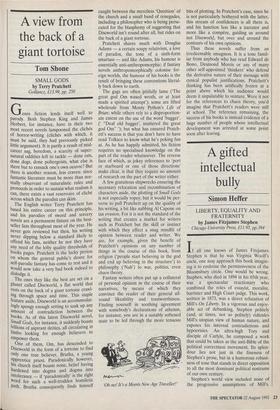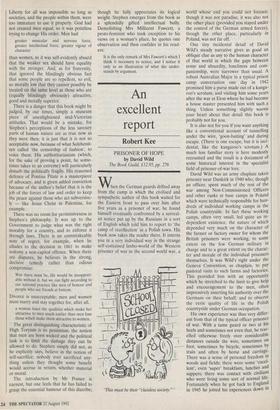A gifted intellectual bully
Simon Heller
LIBERTY, EQUALITY AND FRATERNITY by James Fitzjames Stephen Chicago University Press, f11.95, pp.394 If all one knows of James Fitzjames Stephen is that he was Virginia WooIfs uncle, one may approach this book imagin- ing it to enshrine the permissiveness of the Bloomsbury circle.. One would be wrong. Stephen, who died in 1894 in his 65th year, was a spectacular reactionary who combined the roles of essayist, moralist, barrister and High Court judge. This work, written in 1873, was a direct refutation of Mill's On Liberty. In a vigorous and enjoy- able act of debunking, Stephen politely (and, at times, not so politely) ridicules Mill's utopian view of human nature, and exposes his internal contradictions and hypocrisies. An ultra-high Tory and disciple of Carlyle, he composed a work that could be taken as the anti-Bible of the political correctness movement. Its splen- dour lies not just in the fineness of Stephen's prose, but in a humorous robust- ness of tone that stands in direct opposition to all the most dominant political nostrums of our own century.
Stephen's world view included none of the progressive assumptions of Mill's. Liberty for all was impossible so long as societies, and the people within them, were too immature to use it properly. God had not created men equal, so it was pointless trying to change His order. Men had
greater muscular and nervous force, greater intellectual force, greater vigour of character
than women, so it was self-evidently absurd that the weaker sex should have equality with the stronger. And, as for fraternity, that ignored the blindingly obvious fact that some people are so repellent, so evil, so morally low that they cannot possibly be treated on the same level as those who are (equally blindingly obviously) attractive, good and morally superior.
There is a danger that this book might be judged, by our times, simply a museum piece of unenlightened mid-Victorian attitudes. That would be a mistake, for Stephen's perceptions of the less savoury parts of human nature are as true now as they were then; it is just that it is not so acceptable now, because of what Solzhenit- syn called 'the censorship of fashion', to voice them. His authoritarianism (which, for the sake of proving a point, he some- times takes to an extreme) will particularly disturb the politically fragile. His reasoned defence of Pontius Pilate is a masterpiece of advocacy, and is given added conviction because of the author's belief that it is the job of the forces of law and order to keep the peace against those who act subversive- ly — like Jesus Christ in Palestine, for example.
There was no room for permissiveness in Stephen's philosophy. It was up to the Government to judge what was the right morality for a country, and to enforce it through laws. There is an unmistakeable note of regret, for example, when he alludes to the decision in 1861 to make sodomy a non-capital offence. When there are disputes, he believes in the strong, decisive remedy rather than odious compromise:
War there must be, life would be insupport- able without it, but we can fight according to our national practice like men of honour and people who are friends at bottom.
Divorce is unacceptable; men and women must many and stay together for, after all,
a woman loses the qualities which make her attractive to men much earlier than men lose those which make them attractive to women.
The great distinguishing characteristic of High Toryism is its pessimism, the notion that men are born wicked and the political task is to limit the damage they can be allowed to do. Stephen simply did not, as he explicitly says, believe in the notion of self-sacrifice; nobody ever sacrificed any- thing unless they thought some benefit would accrue in return, whether material or moral.
The introduction by Mr Posner is earnest, but one feels that he has failed to grasp the essential humour of this diatribe; though he fully appreciates its logical weight. Stephen emerges from the book as a splendidly gifted intellectual bully. Demolishing Mrs Millicent Fawcett, a proto-feminist who took exception to his views on a woman's place, he quotes one observation and then confides in his read- ers:
It is the only remark of Mrs Fawcett's which I think it necessary to notice, and I notice it only as an illustration of what she under- stands by argument.











































 Previous page
Previous page